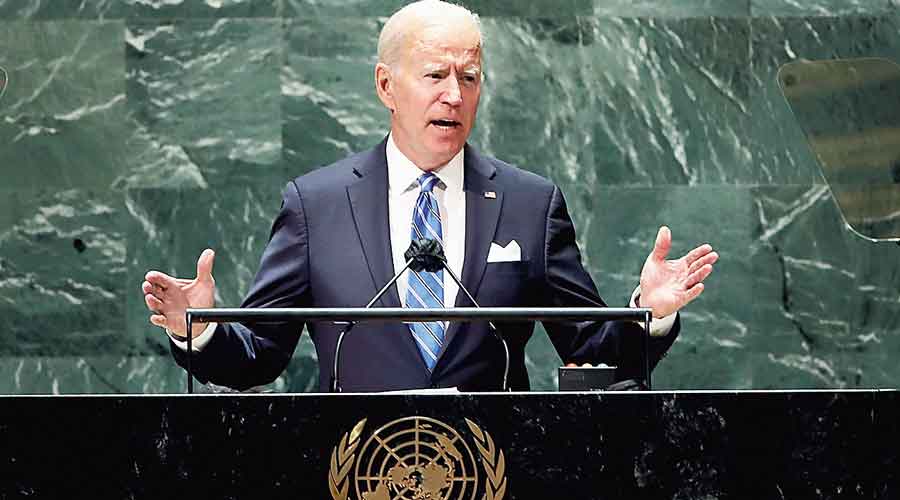President Joe Biden delivered his debut address to the annual gathering of world leaders at the UN on Tuesday amid strong new doubts about his ability to vault the US back into a position of global leadership after his predecessor’s fractious tenure and promotion of “America First” isolationism.
Speaking to a smaller-than-usual audience of his peers because of the still-raging coronavirus pandemic, Biden called for a new era of global unity against the virus, emerging technological threats, and the expanding influence of autocratic nations like China and Russia.
“No matter how challenging or how complex the problems we’re going to face, government by and for the people is still the best way to deliver for all of our people,” he said, insisting that the US and other western allies will remain vital partners.
“Our security, our prosperity and our very freedoms are interconnected, in my view, as never before.”
The UN convened its annual speeches by world leaders on Tuesday against a backdrop of disastrous climate change, polarised superpower relations and a devastating pandemic that has worsened the global rich-poor divide.
“We are on the edge of an abyss and moving in the wrong direction,” António Guterres, the secretary general, said in his opening remarks.
The event also amounted to a major test of credibility for President Biden, who was among the first to address the 193-member General Assembly. Among the last to speak will be President Xi Jinping of China, via pre-recorded video, bookending a day with the competing views of the two most powerful countries in the world.
Despite his avowed enthusiasm for the UN — a marked departure from President Donald J. Trump — Biden was making his debut speech as President amid strong new doubts about his ability to vault the US back into a position of global leadership after his predecessor’s fractious tenure and promotion of “America First” isolationism.
Many expected Biden to expound on the theme that the world faces a choice between the democratic values espoused by the west and the disregard for them by China and other authoritarian governments. But he spoke in the context of a spate of negative news.
He has not been able to contain the Covid-19 pandemic at home, and his efforts to help provide vaccines to other struggling areas of the world have done little to mitigate the yawning discrepancy in inoculation rates between wealthy and poor countries. According to the WHO, nearly three-quarters of the 5.7 billion vaccine doses given so far have gone to just 10 countries, including the US.
Biden’s appearance also comes less than a month after the chaotic US exit from its 20-year military engagement in Afghanistan. The hastily organised withdrawal has emboldened the Taliban, created a new wave of asylum seekers and re-created a possible haven for terrorist groups.
And last week Biden blindsided and outraged France, the United States’ most longstanding ally, in an arms deal with Australia that left one of the biggest French military contracts in ruins and created new doubts in the European Union about his administration’s honesty.
Climate change and the pandemic are also expected to dominate the week, and Mr. Biden planned to host a Covid summit on the sidelines.
Other important topics include crises relating to the Taliban takeover in Afghanistan, this year’s military coup in Myanmar, the Iran nuclear deal, the political vacuum in Haiti and the conflicts in Ethiopia, Syria and Yemen.
New York Times News Service











